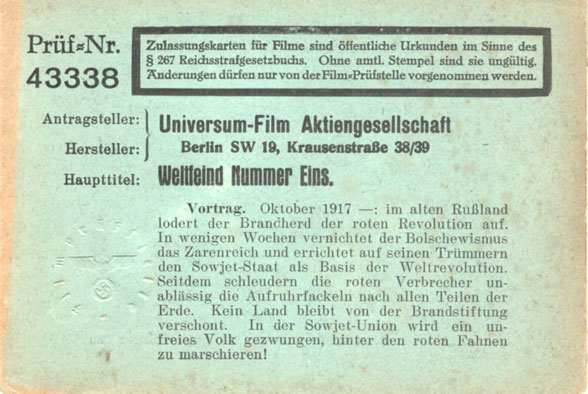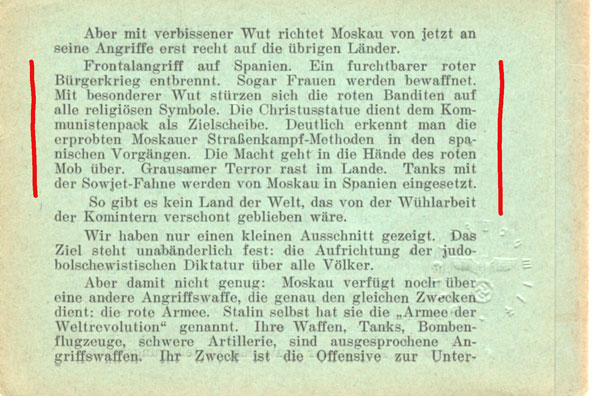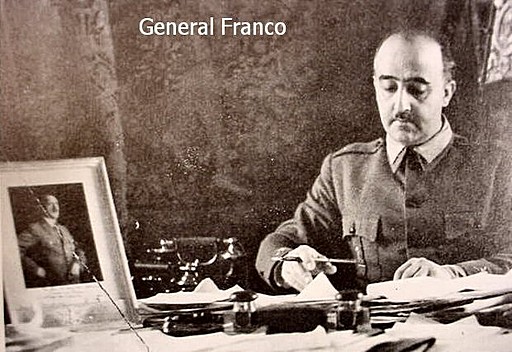- Home
- POSTER GALLERY
- ❗️BOOK & POSTER STORE❗️
- About the Posters
- The William Gillespie Collection
- Our Publishing House
- ❗️GFDN interviews author and collector William Gillespie ❗️
- Our most expensive & inexpensive finds!
- ❗️***NEW!*** Poster of the Month ❗️
- ❗️NEW ❗️Film Posters – Demands on an important means of film advertising. ❗️
- In our Book + Zeitschrift Library
- ❗️ ***NEW!*** Hitler Youth Quex – A Guide for the English–speaking Reader ***NEW!*** ❗️
- ❗️***NEW!*** Table of Contents of our new HJ QUEX book❗️
- ❗️Hitler Youth Quex Guide - early praise! ❗️
- Recent loans from the Collection
- Farewell Horst Claus. (1940–2024)
- "Der Deutsche Film" Zeitschrift
- ❗️ ***NEW!***German "Tendency" Films (Tendenzfilme) in the Third Reich ❗️
- KARL RITTER
- Karl Ritter original film posers in this Collection
- "Besatzung Dora" ( † 1943)
- "The Making of The Crew of the Dora"
- Karl Ritter at the 1938 Reichsfilmkammer Congress
- INDEX -"Karl Ritter" book, 2nd edition
- Karl Ritter's Legion Condor (1939, unfinished)
- Excerpt from our "Dora" book
- ∆∆∆∆∆ High praise for our DORA book! ∆∆∆∆∆
- TABLE OF CONTENTS – "Legion Condor"
- § § § § § Early Praise for our LEGION CONDOR book! § § § § §
- ❗️"Das Leben geht weiter" and Karl Ritter ❗️
- Zarah Leander Europe–wide !
- Japan Military Film and Karl Ritter
- Karl Ritter after 1945
- 1935 Film Congress
- Poster Exhibition in Berlin, March 1939
- Potsdam poster exhibition 12 April–25 August 2019
- Leni Riefenstahl's two "Olympia" Films (1938)
- "Ohm Krüger" (1941)
- Emil Jannings
- "Blutendes Deutschland" (1933)
- Hannes Stelzer ( † 1944)
- Klaus Detlef Sierck ( † 1944)
- Film stills
- Reich Film Censorship Offices
- ❗️Dateline: Ufa - April 11, 1945 ❗️
- ❗️***NEW!***The Fate of the German Film Industry in May 1945 ❗️
- Film censorship cards
- Film Archives
- Cinema advertising
- School filmstrips
- ❗️UPDATED❗️ Z F O / Ostland Film G-m-b-H
- Z F O / Herbert Jacobi estate
- ZFO / Ostland Film newspaper articles
- ❗️***NEW!*** Roter Nebel / Red Fog / Red Mist (1942/1943, ZFO) ❗️
- ZFO - Der Rückkehrer - The Returnee (1943/1944)
- The D F G production company
- D I F U
- ❗️ ***NEW!*** "Carl Peters" – Special Collection. ❗️
- "Alcazar" (1940, Genina)
- "Der 5. Juni" (1943, banned)
- ❗️ ***NEW!*** Herbert Selpin and his "Titanic" (1943) ❗️
- ❗️ ***NEW!*** Ein Robinson (1940, Fanck) ❗️
- "Fronttheater" (1942)
- Veit Harlan's Jud Süß and Fritz Hippler's Der Ewige Jude
- Harlan "Jud Süß" trial 1949
- Werner Krauss & JUD SÜß
- Anti-Semitic Film Posters in the Collection
- "Heimkehr" (1941)
- "Hitlerjunge Quex" (1933)
- ❗️***NEW!*** Hitlerjunge Quex in 111 Greater Berlin Cinemas ❗️
- Jürgen Ohlsen
- "S.A.Mann Brand" (1933)
- "In der roten Hölle" (Edgar Neville, 1939)
- "Helden in Spanien" (1938)
- The Spanish Civil War in Film
- Andrews Engelmann (1901 – 1992)
- Deutsche Wochenschau
- Uƒa Feldpost
- Uƒa Kulturfilm – Informationen
- " Die Tochter des Samurai" (1937, Fanck)
- Ufa 25th Anniversary
- Invitations to world premieres
- ❗️***NEW!*** Continental Films, Paris 1940–1944 ❗️
- Film Censorship in Occupied Paris 1942
- "Der Sieg des Glaubens" (1933)
- Wilhelm Althaus Estate
- Weimar Germany posters
- Ufa and the Ordensburgen
- The Gaufilmstelle in our Collection
- "Zwei Welten" (1940)
- "Capriccio" (1938) –Karl Ritter film album
- Unrealised NS Propaganda Films 1934–1945
- German Film Directors accused of "war crimes"
- Australian––themed NS feature films
- "Der Störenfried" / "The Troublemaker"
- What was new in 2014?
- What was new in 2015?
- What was new in 2016?
- What was new in 2017?
- What was new in 2018?
- What was new in 2019?
- What was new in 2020?
- What was new in 2021?
- What was new in 2022?
- What was new in 2023 ?
- What's new in 2024?
- ❗️***NEW!*** Hitler assassination attempt in Karl Ritter film cut❗️
- BESATZUNG DORA private photos
- Just discovered 1942 article on BESATZUNG DORA
- The Karl Ritter Tetralogy
- Google Analytics 2023
- Our first–ever acquisition!
- ❤️"Some of our favourite things....!"❤️
- ERRATUM for our " Hitler Youth Quex Guide"
- Trending
- Vale †
- Our Wants List / 2024 / Wunschliste
- Pop Quiz
- Unsere KARL RITTER Bücher in Deutschland liefbar!
- WHERE to buy our books right now?
- ✉️Contact
 “History is not about the facts. It is about the context and who is telling the story.” —Prof. Milton Fine.
“History is not about the facts. It is about the context and who is telling the story.” —Prof. Milton Fine.
"Who controls the past controls the future: who controls the present controls the past." –– George Orwell in his novel "1984."
"Whoever doubts the exclusive guilt of Germany for the Second World War destroys the foundation of post–war politics." –– Prof. Theodor Eschenberg, Rector, the University of Tübingen.
"If we have our own why in life, we shall get along with almost any how." – Friedrich Nietzsche
POSTER GALLERY --view
over 500 German film
original posters between
1927–1954 from
Germany and from
many Axis and Neutral countries
across Europe!
Note! Posters in the Poster Gallery are PERMANENT
acquisitions which are NOT FOR SALE!! ONLY the
posters listed in our POSTER STORE are for sale.
(They have a price and order button to use.)
The Spanish Civil War in Film – A summary from a 1974 retrospective seminar in Berlin
A 1974 publication of the Friends of the Deutsche Kinemathek in Berlin was published as a guide to a three day seminar about the films of the Spanish Civil War. Some of these films were to be shown during the seminar.
The guide lists films made as early as 1932 (Les Herdes, Dir. Luis Buneul, Spain) and as recent as 1974 (Les deux Memoires, Dir. Jorge Semprun, France.)
As the two motion picture production centres in Spain were located in Madrid and Barcelona –– both occupied by Popular Front forces of the Republicans and their Soviet ally – they could put out propaganda film shorts and features throughout the war years until defeat. The Popular Front/Red forces also could rely on Hollywood, Soviet Russia, Britain, France, and other friendly film countries to churn out anti-Franco propaganda during these years as well.
The Franco forces, on the other hand, had no major motion picture studios or labs available in their Spanish zone and had to rely on foreign countries such as Germany and Italy for film assistance. Even getting weekly newsreel footage processed outside of the country and distributed required long delays.
It is telling that the 1974 publication lists, all up, the following tally of films about the War:
Popular Front/Republicans & Communists:
15 feature films (including Luis Buneul, Alain Resnais, Andre Malraux, and Hemingway’s pro–Red For Whom the Bell Tolls),
9 short documentary films,
20 (Soviet) newsreels
Pro-Franco:
3 feature films (those Directed by Edgar Neville, Augusto Genina, Harald Riehn respectively.)
2 documentary films (Helden in Spanien, Im Kampf gegen den Weltfeind.)
9 (German) newsreels.
1 feature film (Dir. Karl Ritter, Legion Condor, unfinished.)
There were also two German feature films with the Spanish Civil War being treated positively within a much larger story-line: Wunschkonzert and Kameraden auf See.
The 1974 Deutsche Kinemathek guide is not complete. It for instance does not include feature films produced by Franco Spain such as ¡A mi la Legion!, Esquadrilla, Rojo y Negro, or Boda en el Infierno. Nor does it mention the Italian Fascist feature film from 1943, Inviati Speciali (Corrispondenti di Guerra) / Special Entries (War Correspondents) directed by Marcellini. But it mirrors the abundance of pro–Red films available and the virtual absence of pro–Franco films.
Edgar Neville's Frente de Madrid/In der Rotem Hölle was only re–discovered in 2008 and released in 2018 on DVD, and Ritter's In Battle Against the World Enemy /Im Kampf gegen den Weltfeind was finally also released on DVD two years earlier, in 2016. Both available from International Historic Films in Chicago, USA with English subtitles, and the latter film also with optional Spanish subtitles. The Carlos Arevalo film Rojo y Negro is also ignored. The Augusto Genina film and the Harald Riehn films have been available on commercial DVDs in Italian and German soundtrack versions respectively, for some years now, as well. The "Filmclub Edition" has the Genina Alcazar film listed in their forthcoming catalogue as the German synchronised DIFU version, but as at mid–2021 there is no sign of it.
Also missing from the Kinemathek publication is the September 1936 short (313 meter) film Weltfeind Nr. 1 / World Enemy Nr. 1 produced by Ufa film studio. We reproduce from our Collection the first page cover of the film's censorship card as well as the page in which the Spanish Civil War footage is described:


This ideological bias towards Republican/Red feature films is still being practiced in 2021. IMDb, for example lists 73 Spanish Civil War films for visitors of that very popular website. Just two are pro-Franco (Alcazar and Raza) and the other 71 films are pro-Red, anti-Franco and that's that.
The important role that Karl Ritter's two Spanish films played --- the full–length documentary film In Battle Against the World Enemy /Im Kampf gegen den Weltfeind and his planned feature film Legion Condor –– should be seen in the context of the very few pro–Franco films made.
A more recent study by a Spanish film historian noted the current day inventory of Spanish Civil War films found in the Spanish National Film Archives thusly:
In Spain, the Civil War has been one of the events that has generated the most ink and audiovisual materials. However, a paradoxical phenomenon has occurred. Of the more than 600 titles preserved in the Spanish Film Archive, 460 correspond to the Republican side and only 126 to the one that won the war.
The world media depicted the battle between the “Republican” government and the Franco forces as one of a legitimately elected government of Socialists, Anarchists and Communists fighting against a failed military coup of fascists. Tens of thousands of International Brigade foreign volunteers from many countries, as well as massive military and secret police support from Stalin, made a civil war inevitable.
Ninety years on, there is more and more evidence that the “Republican” government was elected because of fraud in 1936. The vast majority of the 37 assassinations of politicians running for office were committed by Reds, as per Wikipedia.
Historian Stanley Payne argues that the leftist victory may not have been legitimate; Payne says that in the evening of the day of the elections leftist mobs started to interfere in the balloting and in the registration of votes distorting the results; Payne also argues that President Zamora appointed Manuel Azaña Díaz as head of the new government following the Popular Front's early victory even though the election process was incomplete. As a result, the Popular Front was able to register its own victory at the polls and Payne alleges it manipulated its victory to gain extra seats it should not have won. According to Payne, this augmented the Popular Front's victory into one that gave them control of over two-thirds of the seats, allowing it to amend the constitution as it desired. Payne thus argues that the democratic process had ceased to exist.[41]
41. Payne, S.G. and Palacios, J., 2014. Franco: A personal and political biography. University of Wisconsin Press. p. 105
